
Acleris forsskaleana, the maple leaftier moth, is a moth of the family Tortricidae. It is found in Europe and North America in woodlands and gardens.
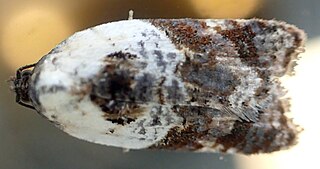
Acleris variegana, the garden rose tortricid moth or fruit tortricid, is a moth of the family Tortricidae. It has a Palearctic distribution. The moth flies from July to September mainly at night and is attracted to bright lights. The larvae feed on various trees and shrubs including rose and apple.
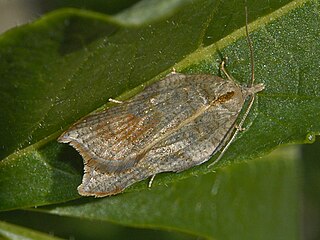
Acleris emargana, the notched-winged tortricid, is a moth of the family Tortricidae. The species was first described by Johan Christian Fabricius in 1775.

Acleris is a genus of moths belonging to the subfamily Tortricinae of the family Tortricidae. As of 2007, about 241 species were known.

Acleris hastiana is a moth of the family Tortricidae. It is found in Europe, northern Iran, Kazakhstan, Ala Tau, central Siberia, Irkutsk, the Amur region and China. In North America it is found from the north-eastern United States across southern Canada to British Columbia and south along the Pacific Coast to California.
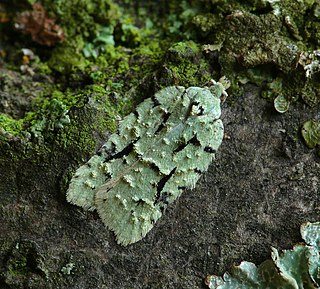
Acleris literana, the sprinkled rough-wing, is a moth of the family Tortricidae. The species was first described by Carl Linnaeus in his 1758 10th edition of Systema Naturae. It is found in most of Europe and in the Near East.

Acleris holmiana, the golden leafroller moth, is a moth of the family Tortricidae. It is found in most of Europe and Asia Minor.

Acleris laterana is a moth of the family Tortricidae. It is native to the Palearctic realm, but has been accidentally imported into the United States.

Acleris ferrugana is a species of moth of the family Tortricidae. It is found in China, most of Europe and has also been recorded from North America.
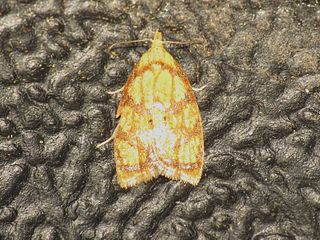
Acleris bergmanniana, the yellow rose button moth, is a moth of the family Tortricidae. It is found from most of Europe to the eastern Palearctic realm.

Acleris schalleriana, the viburnum button or Schaller's acleris moth, is a moth of the family Tortricidae. It was described by Carl Linnaeus in 1761. It is found in most of Europe. It is also found in North America. Acleris viburnana is a possible synonym that refers to the North American populations.
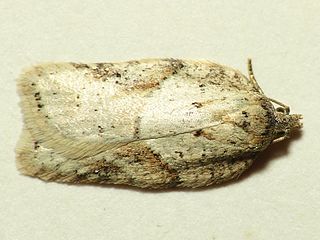
Acleris logiana, the black-headed birch leaffolder moth or grey birch button, is a moth of the family Tortricidae. It was described by Carl Alexander Clerck in 1759. It is found in most of Europe, except Ireland, Portugal, most of the Balkan Peninsula and Ukraine. It is also found in North America, the Russian Far East, Korea and Japan.
Acleris nigrilineana is a species of moth of the family Tortricidae. It is found in Korea, Japan, the Russian Far East and Denmark, Norway, Sweden, Finland, Poland, European Russia, Estonia and Latvia.

Acleris quercinana is a species of moth of the family Tortricidae. It was described by Zeller in 1849. It is found in most of Europe, Asia Minor and Iran.
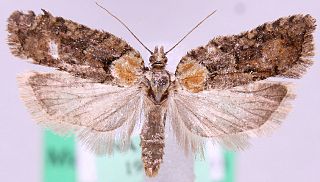
Acleris abietana, the Perth button, is a species of moth of the family Tortricidae. It is found in Europe, where it has been recorded from Great Britain, Ireland, France, Belgium, the Netherlands, Germany, Denmark, Austria, Switzerland, Italy, the Czech Republic, Slovakia, Slovenia, Poland, Hungary and Russia. The habitat consists of coniferous woodlands.
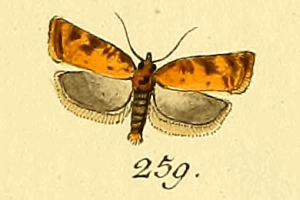
Acleris aspersana, the ginger button, is a species of moth of the family Tortricidae. It is found in Europe, where it has been recorded from Ireland, Great Britain, France, the Benelux, Germany, Denmark, Austria, Switzerland, Italy, the Czech Republic, Slovakia, Slovenia, Croatia, Hungary, Bulgaria, Romania, Poland, Norway, Sweden, Finland, the Baltic region and Russia. It is also found in the Near East and the eastern Palearctic realm. Their habitat consists of meadows and forest edges.

Acleris fimbriana, the yellow tortrix moth, is a species of moth of the family Tortricidae. It is found in France, Germany, Denmark, Italy, Slovakia, Hungary, Romania, Poland, Norway, Sweden, Finland, the Baltic region, Ukraine and Russia. It is also found in China and South Korea.

Acleris shepherdana, the meadow-sweet button, is a species of moth of the family Tortricidae. It is found in Europe, where it has been recorded from Great Britain, France, the Benelux, Germany, Denmark, Austria, Switzerland, Italy, the Czech Republic, Slovakia, Poland, Hungary, Norway, Sweden, Finland, the Baltic region and European Russia. It is also found in the Russian Far East (Ussuri), Manchuria, Mongolia, China and Japan. The habitat consists of fens, marshes, river-banks and other damp areas.

Acleris umbrana is a species of moth of the family Tortricidae. It is found in Great Britain, France, Belgium, Germany, Austria, Switzerland, Italy, the Czech Republic, Slovakia, Poland, Hungary, Norway, Sweden, Finland, the Baltic region and Russia. In the east, the range extends to Japan. The habitat consists of woodland, fens and marshes.
Acleris negundana, the speckled acleris moth, is a species of moth of the family Tortricidae. It is found in North America, where it has been recorded from the District of Columbia, Georgia, Illinois, Indiana, Kentucky, Maine, Manitoba, Maryland, Massachusetts, Minnesota, Mississippi, Missouri, Ohio, Ontario, Virginia, West Virginia and Wisconsin.

















